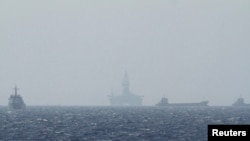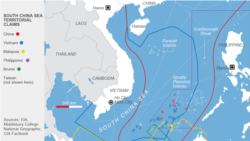The sudden cancellation of an offshore drilling project commissioned by Vietnam is raising fears that the Chinese government pressured it to stop, part of Beijing’s ongoing maritime sovereignty spat with Hanoi.
London-based drilling contractor Noble Corp. said July 9 its Noble Clyde Boudreaux semi-submersible had cancelled a previously announced project with Vietnam. News reports placed the drilling site off Vietnam’s east coast in a zone watched by Chinese survey vessels.
It’s unclear whether officials from Beijing forced the cancelation, but they have pressured other Vietnamese seabed oil drilling contracts in the past. The two countries contest nearby tracts of the broader South China Sea.
“They’re playing some kind of cat and mouse with China,” said Oh Ei Sun, senior fellow with the Singapore Institute of International Affairs. If, he said, “they’re doing drilling here and the Chinese vessel came, they might stop it for a few days or months and then resume it, and so on.”
Brunei, Malaysia, the Philippines and Taiwan also claim all or parts of the 3.5 million-square-kilometer waterway, which is prized for fisheries as well as fossil fuel reserves. China says about 90% of the sea should come under its flag. Beijing has taken a military lead over other countries over the past decade.
Radio Free Asia reported July 13 that Vietnam had cancelled the contract as the Chinese government squeezes Southeast Asian nations that try to exploit South China Sea resources with foreign partners. A Chinese coast guard vessel is “patrolling” now near another Vietnamese oil rig, the report says.
China has sent two survey ships to waters near Vietnam this year to date. China and Vietnam have rammed each other's boats in the past. Their vessels got tangled in deadly clashes in 1974 and 1988.
In 2018, Spanish driller Repsol suddenly quit a Vietnamese project at the South China Sea feature Vanguard Bank, apparently under pressure from China. Vietnam still had outposts at the submerged feature as of mid-2019.
But Vietnam has not openly challenged China over the Noble Clyde project cancelation. Noble Corp. did not respond Monday to a request for comment.
Vietnam relies on oil drilling for resources, Oh said, and the Southeast Asian country has a history of “standing up” to China.
“Vietnam is known to stand up for its interests and they don’t want to be seen to be backing down from any kind of pressure from China, because the moment they do that, they would be susceptible to all kinds of pressure, domestically and in China,” said Eduardo Araral, associate professor at the National University of Singapore’s public policy school.
Hanoi may be waiting to see whether the United States acts on its behalf, analysts believe.
U.S. Secretary of State Michael Pompeo said last week his government would help South China Sea claimant states if violated by China. He hinted at using diplomatic and legal means and rejected China’s legal claims to the sea. China cites historic records to justify its use of the waters.
“Vietnam feels the threats from China, and maybe it will hamper their behavior in the South China Sea if the U.S. doesn’t move forward,” said Nguyen Thanh Trung, Center for International Studies director at University of Social Sciences and Humanities in Ho Chi Minh City.
The United States might intervene if it suits President Donald Trump’s politics but avoid armed conflict, said Alan Chong, associate professor at the S. Rajaratnam School of International Studies in Singapore.
Trump has ramped up military, trade and economic pressure on China, a fellow superpower and former Cold War foe, since taking office in 2017. A reelection campaign and the COVID-19 crisis now dominate Trump’s agenda.
“I wouldn’t put it past him, if it suited him as a tactical move, but in terms of an actual intervention military wise, I don’t think that is a possibility given the domestic distractions at the moment,” Chong said.
Vietnam will nevertheless be “extremely happy” with Pompeo’s statement since its language supports the Vietnamese claim to an exclusive economic zone in the contested sea, said Derek Grossman, senior analyst with the Rand Corp. research institution in the United States.






